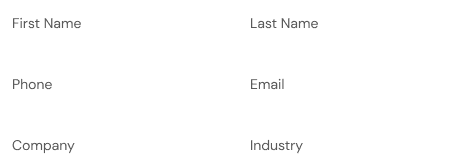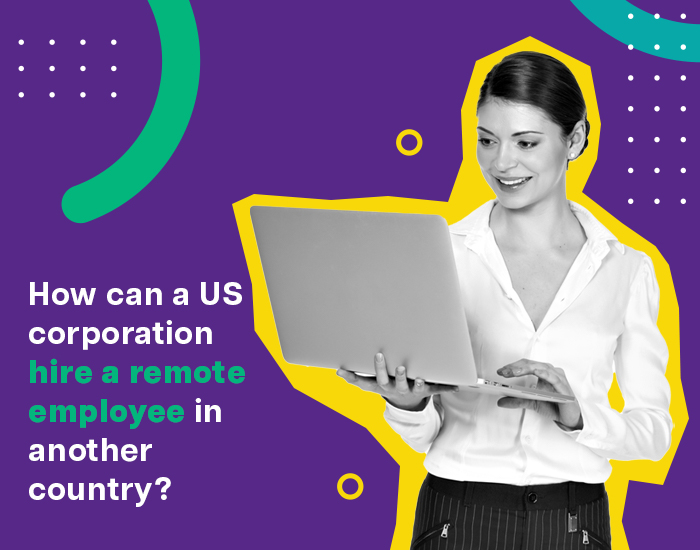
How can a US corporation hire a remote employee in another country?
So, you're considering expanding your talent pool beyond the borders, huh? That's awesome! Hiring a remote employee from another country can indeed be a smart move for your business. It opens up a whole new world of possibilities - a larger pool of candidates, diverse skills and experiences, and often, cost savings.
But let's be honest, it's not all sunshine and rainbows. There are a few challenges you might face. Things like time zone differences, communication barriers, cultural differences, and legal issues can make the process a bit tricky. Not to mention the varying employment laws and regulations in different countries. Phew, sounds a bit overwhelming, doesn't it?
But hey, don't worry! With careful planning, clear communication, and the right tools, you can navigate these challenges and find the perfect overseas talent for your team. Stick around, and we'll walk you through some steps and considerations to keep in mind when hiring a remote employee overseas. Ready to dive in? Let's get started!
- Hiring remote employees overseas offers various benefits such as cost-effectiveness, scalability, increased flexibility, improved product quality, and enhanced customer support.
- It allows business owners to focus more on core areas of their business.
- Despite the benefits, it involves various considerations like obtaining work permits and visas, setting up effective communication systems, ensuring cyber security, providing effective training and onboarding, and managing payroll issues.
- It's essential to understand currency exchange rates, local tax obligations and compliance with employment laws to manage payroll effectively for international employees.
- An experienced recruitment agency can provide expert guidance throughout the hiring process, making it easier for US-based businesses to hire overseas.
- Opting for an Employer of Record (EoR) can be an advantageous step. EoR handles all the complexities of hiring, such as ensuring legal compliance, managing payroll, and providing benefits. This allows companies to focus on their core operations while expanding their international workforce efficiently and effectively. Choosing EoR over other hiring methods can provide businesses with a more streamlined, cost-effective, and hassle-free way of recruiting overseas talent.
Overview of the overseas hiring Problem
The process of hiring a remote employee in another country can be difficult and time consuming. Companies must consider different sets of legalities, language barriers, cultural differences, and lack of trust when making this decision. Additionally, US corporations may face issues related to different labor laws and regulations, currency fluctuations, tax implications for both the employer and employee, visas and work permits, insurance , and other complications.
Benefits of Hiring Internationally
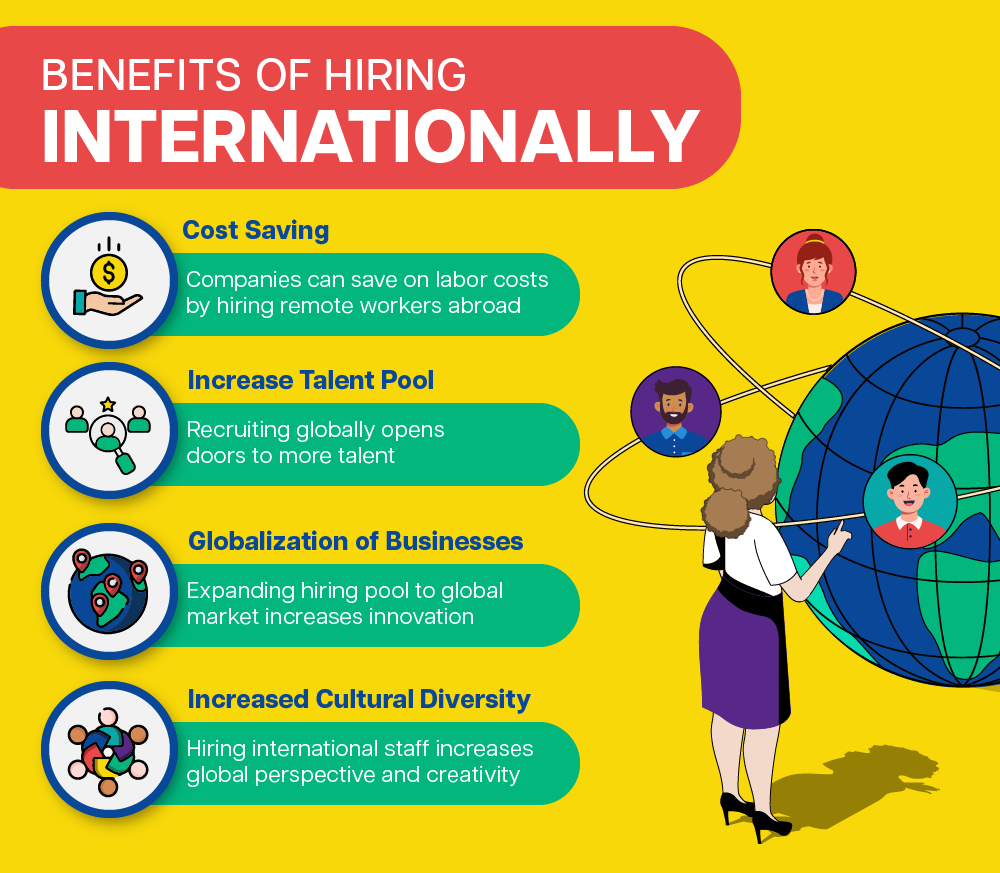
Cost Savings
One of the primary benefits of hiring a remote employee from another country is the potential cost savings. By utilizing talent from other countries, companies can reduce personnel costs by taking advantage of lower wages in different parts of the world. Additionally, there may be tax advantages for both the employer and employee when working with international staff members.
Increased Talent Pool
Now when you decide to expand your horizons and look at a greater set of people to choose potential employees from, of course the chances of recruiting a greater pool of talent from all over the world increases. It is the increase in this talent pool that makes the recruitment process for any organization more efficient and also allows them to find the best talent for their specific job requirements. Companies can also benefit from increased diversity in their workforce and gain insight into different cultures and perspectives.
Globalization of Businesses
Another major benefit to hiring a remote worker from another country is gaining access to a larger and more diverse talent pool. Utilizing global resources allows companies to recruit the best talent regardless of geographic location, which can lead to increased innovation and creativity within the organization.
Increased Cultural Diversity
When a firm decides to hire people from different countries they gain an opportunity to increase the global perspective and cultural diversity in their workplace by bringing in international staff members. This can help to reduce stereotypes, challenge assumptions, and create an understanding of different cultures. Working with employees from other countries also cultivates a more collaborative atmosphere that encourages creative problem solving.
Ways to Hire a Remote Employee Overseas for a US Business
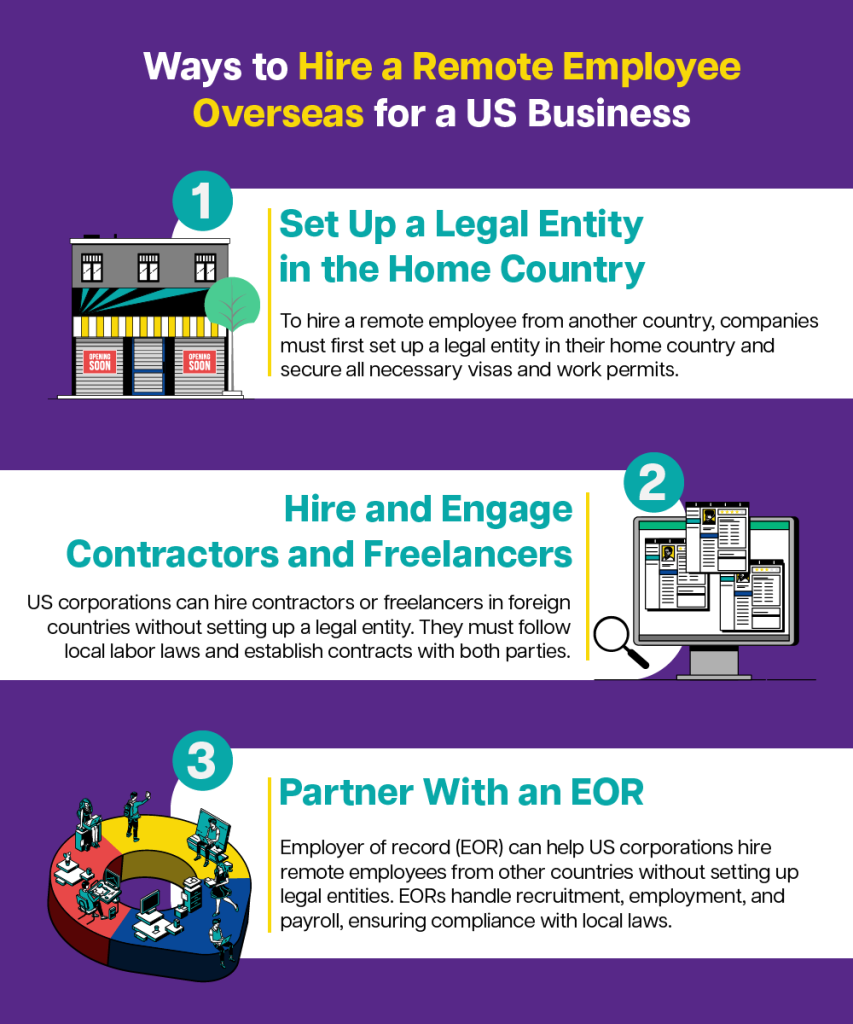
1. Set Up a Legal Entity in the Home Country
The first step to hiring a remote employee from another country is to set up a legal entity in their home country. This will allow the company to register with local authorities and comply with all applicable labor laws. It is also important for companies to ensure that they have properly secured any necessary visas and work permits before beginning the recruitment process.
| Pros of Setting up a Legal Entity in the Home Country | Cons of Setting up a Legal Entity in the Home Country |
| Full Compliance: Ensures full compliance with local labor laws and regulations. | Complex Process: The process of setting up a legal entity can be complex and time-consuming. |
| Work Authorization: Facilitates securing necessary visas and work permits. | Legal Costs: Legal costs for setting up and maintaining the entity can be high. |
| Local Presence: Establishes a physical presence and credibility in the foreign market. | Financial Regulations: Companies may face stringent financial regulations and taxation rules. |
| Control: Provides more control over employee hiring, management, and benefits. | Cultural Differences: Requires understanding and adhering to local business etiquette and cultural norms. |
2. Hire and Engage Contractors and Freelancers
Another option for US corporations is to hire and engage contractors or freelancers in the foreign country. This allows companies to bring on employees without having to set up a legal entity in the home country. It is important for US corporations to ensure that they are following all applicable labor laws when working with contractors or freelancers. Additionally, it is essential that the proper contracts are established for both parties.
| Pros of Hiring Contractors and Freelancers | Cons of Hiring Contractors and Freelancers |
| Cost Savings: Potentially lower labor costs than with full-time employees. | Limited Control: Companies have limited control over the hiring process, management, and benefits. |
| Flexibility: Allows for greater flexibility in the hiring process. | Complex Legal Issues: Companies must adhere to the law when engaging contractors or freelancers. |
| Tax Advantages: May offer tax advantages for both parties. | Short-Term Engagements: These engagements are generally short-term and may not be suitable for long-term projects or permanent roles. |
| Quick Setup: Can be set up quickly without having to establish a legal entity in the foreign country. | Lack of Credibility: Contractors and freelancers may not be seen as credible by local authorities. |
3. Partner With a Employer of Record
One way to hire a remote employee from another country is by partnering with an employer of record (EOR), which offers an easy and cost-effective solution for international hiring. The EOR takes on the legal responsibility of employing staff in different countries, eliminating the requirement for US corporations to establish separate legal entities in each market. With an EOR service provider overseeing recruitment, employment, and payroll activities in the employee's home country, companies can ensure compliance with local laws while bypassing the time-consuming process of setting up a legal entity.
Employer of Record VS Other Ways to Hire Remote Employees
When it comes to hiring remote employees from other countries, using an employer of record is the best option for US corporations. This allows businesses to avoid having to set up a legal entity in the foreign country and ensures full compliance with local labor laws. Additionally, partnering with an EOR can save time and money by eliminating the need for companies to manage payroll and benefits in the employee's home country.
On the other hand, hiring contractors or freelancers is generally a short-term option that does not provide many of the same benefits as an employer of record. This method can be cost effective but does not offer any legal protection or control for US corporations. Additionally, companies may face stringent financial regulations and taxation rules when engaging with contractors or freelancers.
Overall, hiring remote employees from other countries can be a beneficial and cost effective way for US corporations to expand their reach and tap into new markets. Using an employer of record is the optimal decision as it offers full compliance, cost savings, and control over the hiring process. This allows businesses to ensure that proper contracts are established between both parties and that all applicable labor laws are being followed. By understanding the benefits and risks associated with international recruitment, US corporations can make an informed decision when it comes to hiring remote employees from other countries. With the right strategies in place, US businesses can enjoy the rewards of expanding their workforce without having to incur additional costs or legal regulations.
By partnering with an employer of record, US corporations can benefit from the full compliance with local labor laws, cost-effectiveness, control over hire process, and legal protection. This allows businesses to quickly establish a presence in new markets while ensuring that all applicable laws are followed. Furthermore, it eliminates the potential risks associated with setting up a legal entity or working with..
Steps and Considerations for Hiring a Remote Employee Overseas for a US Business
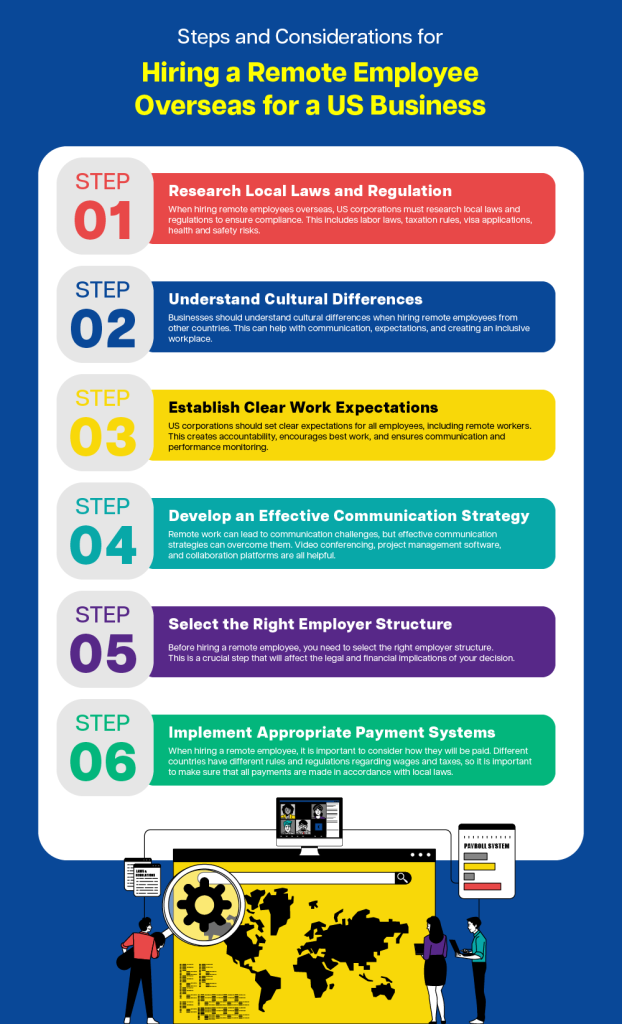
Research Local Laws and Regulations
When hiring a remote employee overseas, it is important to research the applicable laws and regulations in the employee's home country. This encompasses reviewing the local labor laws, taxation rules, visa applications, and any other legal requirements that may be relevant to the employment of foreign workers. Additionally, researching potential health and safety risks in the area can help ensure that employees are working in a safe and secure environment. By understanding the local laws, US corporations can be confident that they are in compliance with all applicable regulations when hiring remote employees from other countries.
Understand Cultural Differences
Aside from research local laws, it is also important for businesses to have a basic understanding of the cultural difference between their own and the employee's home country. This can be beneficial when it comes to establishing effective communication with remote workers, as well as setting expectations for job performance. Additionally, understanding cultural differences can help US corporations create an inclusive workplace environment that values diversity and respects the cultural norms of each employee.
Establish Clear Work Expectations
US corporations should also establish clear work expectations for all employees, regardless of whether they are based in the US or overseas. This ensures that everyone is aware of what their roles and responsibilities are, as well as any additional tasks that may be assigned to them. Furthermore, having a clear set of expectations helps to create a sense of accountability among remote workers and encourages them to do their best work. Additionally, US corporations should ensure that they have a strong system in place to communicate with and monitor the performance of remote employees on a regular basis.
Develop an Effective Communication Strategy
One disadvantage that you might have with hiring remote employees is your control over them and the flow of work. However, that can easily be managed if effective communication is ensured in the business. US corporations should develop a strategy that allows for clear and consistent communication between all team members, regardless of their location. Pandemic has taught all of us to use video conferencing tools, project management software, and other collaboration platforms to ensure everyone is on the same page. Additionally, having an effective communication strategy in place helps to foster better relationships between US corporations and their remote employees, ensuring that all team members feel connected and valued.
Select the Right Employer Structure
Now, let's talk about one of the most crucial steps in hiring an overseas employee - selecting the right employer structure. Think of it as being the architect of your own skyscraper. Before you even start construction, you need to have a solid plan in place. Similarly, before you go about hiring a remote employee, you need to decide on the right structure. Do you directly hire the employee under your corporation? Or do you work with a partner like an Employer of Record (EOR)? Maybe you prefer hiring a contractor? These are questions you need to answer.
Since the employee is going to work remotely you need to be 100% sure they are the right pick for your organisation. Just like you wouldn't build a skyscraper on shaky ground, you shouldn't rush into hiring a remote employee without understanding the legal and financial implications. Are we on the same page so far? Great, let's move on to the next step.
Implement Appropriate Payment Systems
Once you have the right employer structure in place, it's time to start thinking about how your remote employees will be paid. This is a key factor to consider when hiring an overseas employee as different countries may have their own rules and regulations regarding wages and taxes. It's important to know what those are and ensure that all payments are made in accordance with local laws. Additionally, you should also consider setting up an appropriate payment system to ensure that all employees are paid on time and accurately.
Hiring a remote employee for a US business has a very tedious process involving of numerous steps and considerations that must be taken into account. From researching local laws to establishing effective communication strategies, it is important for businesses to understand the nuances of the process in order to ensure compliance and make the most of their remote employees. Now this is where partnering with an Employer of Record (EOR) serves amazingly by simplifying the process while mitigating potential risks. By following these steps, US corporations can confidently hire a remote employee overseas and reap the many benefits that come along with it.
Identifying Target Countries for Hiring
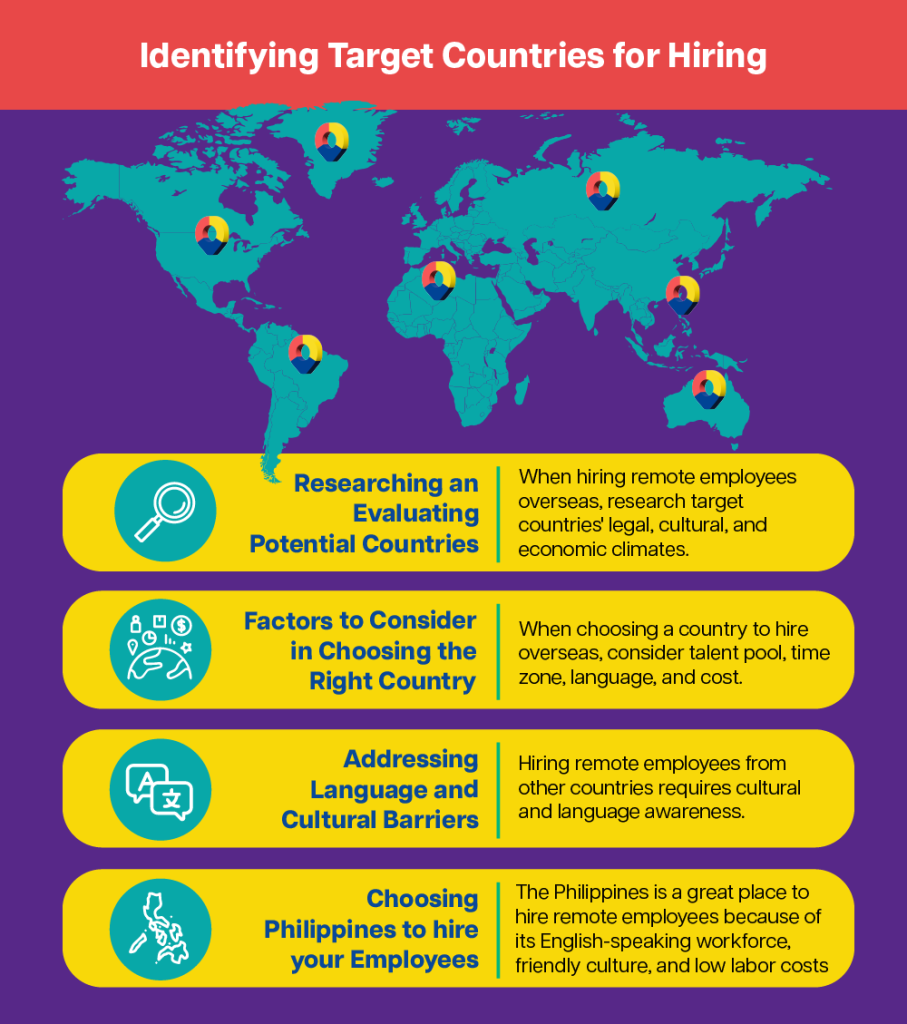
Researching and Evaluating Potential Countries
Now that you are familiar with the steps and considerations for hiring a remote employee overseas, it is time to begin researching potential target countries. This includes evaluating the legal climate of each country to determine which ones have regulations that your corporation can comply with. Additionally, it is important to consider cultural factors when choosing a country as this can affect communication and collaboration with local employees. Finally, it is also important to research the economic climate of each country to identify which ones provide the best opportunities for remote workers.
Factors to Consider in Choosing the Right Country
Choosing the right country for hiring overseas is like picking out the perfect pair of shoes. You've got to make sure it's a good fit! When scouting for the best location, you need to consider a few key factors.
First off, take a look at the talent pool. What skills are you after? Maybe you need a tech wizard to level up your IT game, or a marketing guru to spread the word about your brand. Make sure the country you're eyeing up has a rich pool of the talent you need.
Next, think about the time zone. If you're a night owl, maybe a different time zone won’t bother you. But if you like your beauty sleep, you might want to pick a country whose working hours overlap with your own. Trust me, no one likes to be stuck in a meeting at 3 AM!
And then there's the language. You don't want to play a game of broken telephone when you're running a business, right? So, make sure you're choosing a country where folks can speak your language.
Finally, don't forget about the cost. Hiring overseas can save you some serious dough, but only if you pick the right country. Compare wage rates, check out living costs, and do your math before making a decision.
So, there you have it. Keep these points in mind, and you'll be wearing that perfect pair of shoes in no time—we mean, hiring top-notch talent from just the right place!
Addressing Language and Cultural Barriers
When determining the best country for hiring remote employees, it's essential to consider language and cultural barriers. Even if the talent pool is fluent in English, there will likely be certain nuances that US-based businesses aren't familiar with. It's important to do research on the local customs of each target country, as well as make sure that all team members are aware of the cultural norms.
Other than the local customs, language barriers must also be considered by the firm when it comes to communication. Why? Because what if the the team needs to speak a specific language in order to effectively collaborate? You need to make sure whether a particular language can suffice or not? Additionally, US-based businesses should take into account any potential accent or dialect differences when communicating with their remote employees overseas.
Choosing Philippines to hire your Employees
So, you've got your steps nailed down, and you're ready to jump into the international talent pool. But where do you start? Let's take a closer look at one of the popular choices - the Philippines. Why the Philippines, you ask? Well, let me tell you!
The Philippines is well-known for its strong English-speaking workforce. And we're not just talking about conversational English. Nope, these folks also have a strong grasp of technical and business English. This means communication is going to be a breeze!
On top of that, the vibrant culture of the Philippines produces employees who are hard-working, reliable, and super friendly. They've got a solid reputation for being dedicated team players, and who doesn't want that?
The cherry on the top is the fact that the cost of labor in the Philippines is relatively low compared to other countries. So, you're getting high-quality talent without emptying your pockets. There’s also the very conventional time zone advantage for US-based businesses. It's practically tailor-made for efficient workflow.
I could go on, but you get the idea. The Philippines offers an incredible combination of skill, dedication, affordability, and flexibility. So, what are you waiting for? Dive in and discover the talent that's waiting for you in the Philippines!
Legal and Compliance Considerations

Understanding International Labor Laws and Regulations
When hiring a remote employee overseas, it is important to understand the international labor laws and regulations of each target country. This includes researching local employment policies and tax requirements in order to ensure compliance with all relevant laws. Additionally, US corporations should consider any applicable visa or work permit requirements for their remote workers.
Working with remote workers comes with a lot of homework to do. It is imperative for US-based businesses to be aware of any global standards and regulations when working with remote workers. This includes understanding labor laws concerning minimum wages, overtime pay, working hours, and other employment rights. It is also equally important to research any safety protocols in the workplace such as health and safety measures for employees.
Tax Implications for Hiring Remote Employees Abroad
When hiring remote employees overseas, US-based businesses must also consider the potential tax implications. It is important to understand the tax regulations of each target country as this can have a significant impact on your business and its bottom line. For example, countries may require employers to withhold taxes from employee salaries or pay payroll taxes for their foreign workers. Additionally, companies should be aware of any applicable transfer pricing regulations when sending remittances overseas.
Work Permits and Visas for Foreign Employees
US-based businesses must also consider any applicable work permits and visas for foreign employees. This includes researching the requirements for each target country, as well as submitting all necessary documents to obtain the necessary permits. Now even though you are hiring people “remotely”, you still need to be aware of any specific immigration regulations that may affect their ability to hire overseas. In some countries, US companies may need additional certifications or authorizations to employ foreign nationals.
Building a Remote-Ready Infrastructure
Setting Up Communication and Collaboration Tools
When hiring remote employees overseas, it is essential to set up communication and collaboration tools to ensure smooth workflow. This can include chat applications, video conferencing systems, project management software, and other digital tools for facilitating communication between team members. Additionally, US corporations should consider setting up online portals or websites for human resources tasks such as application tracking and onboarding processes.
Cybersecurity Measures for Remote Operations
With great power comes greater responsibility. We all love this quote. What we are trying to say is, US-based businesses must also consider cybersecurity measures. This includes setting up authentication protocols and access controls to protect the company's online data from cyberthreats. Additionally, it is important to ensure that all employees are aware of their security obligations, such as being vigilant about phishing emails and other scams.
Providing Training and Onboarding for Remote Employees
Finally, US corporations should make sure that all remote employees receive proper training and onboarding. This can include providing general information about the company's structure, policies, processes, and procedures. Additionally, employers should provide access to any necessary resources or tools to allow for successful integration into the team. Finally, employers should set up systems for feedback and performance metrics in order to ensure that remote employees are meeting their goals.
Payroll and Payment for International Employees
Taking care of payroll for your overseas remote employees sure can seem daunting, but don't fret, we've got your back! Here's a quick rundown:
- Understanding Currency Exchange: Don't forget that you'll be dealing with different currencies and exchange rates. Keep a tab on those fluctuations to ensure fair and accurate payment.
- Local Tax Obligations: Just like we talked earlier about tax implications, you gotta remember to factor in local tax obligations too. It's all part of the game!
- Compliance with Employment Laws: You've got to stick to the rules. Always ensure you're in line with the local employment laws.
- Paying on Time: No one likes late paychecks. Make sure you've got a process in place to ensure timely payment. It's key to keeping your remote workers happy and motivated!
- Consider a Payroll Provider: It may be a good idea to use a local payroll provider or an international one that covers the country where your remote employee is based. They'll take care of all the nitty-gritty details for you. Trust me, it's worth it!
How Hiring a Remote Employee Overseas Can Be a Wise Decision
Reduced Overhead Costs
Organizations love to hire remote employees overseas because of the one aspect that is simply irresistible to them – cost saving. With remote workers, there's no need to worry about office space, utilities, or other overhead costs associated with maintaining a physical workspace. You simply pay for the work done – it's as simple as that!
Increased Flexibility and Scalability
Hiring remote workers gives your business a superpower – the power of flexibility! You can easily scale up or down your workforce as per your business needs. And the best part? Time zones can be your friend. When your US team is off the clock, your overseas team can take over, and your business never stops!
More Time for Business Owners to Focus on Core Areas
Remember how we always wish for more hours in a day? Well, hiring remote employees might just be an answer to that! Hiring remote employees definitely allows to focus more on strategic aspects and core areas of the business than spend time on managing physical offices and commuting. Sounds like a win-win to me!
Improved Customer Service and Product Quality
With an international team, you get a wider perspective. Different team members bring different viewpoints to the table, which can greatly enhance your product quality. Plus, with a team working round the clock, your customers get 24/7 support. Now, that's what I call top-notch service!
Staff Retention
Happy employees stick around, and what could make them happier than the flexibility of working from home? When employees are engaged in remote work,their job satisfaction increases, which can lead to higher staff retention. Not to mention, it's a great way to win top talents from all over the world. It’s a no-brainer, really!
How Remotify Can Help You Get Rid of All the Hassles
Navigating the world of international hiring can feel like a maze. But guess what? You don't have to go it alone! With Remotify, we're right there in the trenches with you every step of the way. We're all about streamlining the process and making it as hassle-free as possible. Need help with setting up your remote team's communication tools? We've got you covered. Puzzled by payroll laws in different countries? Our experts are on it. Want to ensure your remote operations are secure? We've got an array of cybersecurity measures up our sleeve. So, come on board, let's embark on this international hiring journey together!
Conclusion
Hiring a remote employee overseas is an excellent way for US-based businesses to gain access to top talent from all around the world. However, it's not as simple as it seems and involves various considerations such as work permits and visas, setting up communication systems, cyber security measures, training and onboarding processes, payroll issues, etc. But with the right approach, companies can leverage the benefits of remote work to create a successful international team. With careful planning and strategy, hiring remote employees overseas can be a wise decision for any US-based business.
If you're looking to hire a remote employee overseas but don't have the time or resources to go through all these steps, consider working with an experienced Employer of Record that specializes in international recruitment. They can provide expert guidance through the entire hiring process, from finding talented candidates to obtaining all the necessary paperwork.
So what are you waiting for? Start your search for a remote employee overseas today and watch as your global team grows into an unbeatable powerhouse. Good luck!
FAQs (Frequently Asked Questions)
What are some of the benefits of hiring a remote employee overseas for a US business?
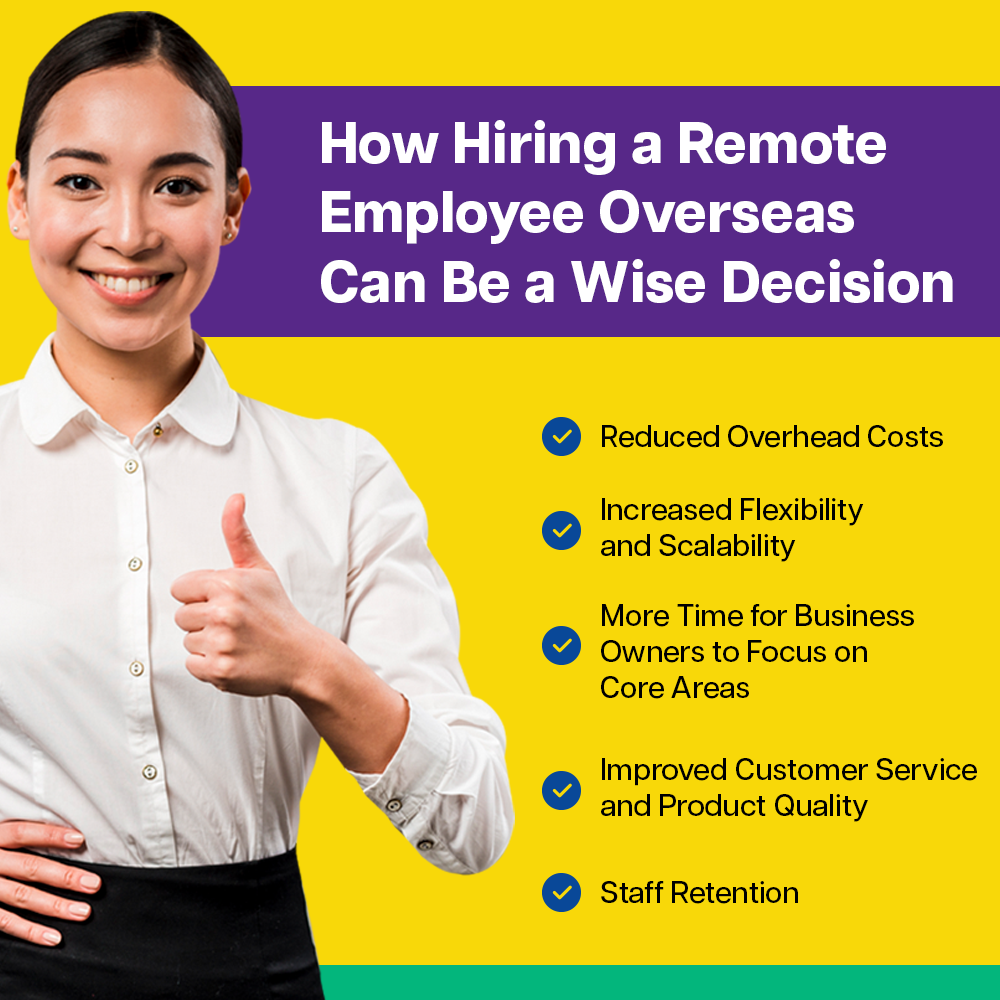
Hiring a remote employee from overseas? Let me tell you why:
- Talented pool: The world is your oyster, literally! You get access to a diverse pool of incredible talents. Why limit yourself when you can reach out to the best minds across the globe?
- 24/7 coverage: Remember the headache about different time zones we talked about earlier? Well, it comes with a silver lining. With team members spread across various time zones, your business could potentially offer round-the-clock service. Talk about a win-win!
- Cost savings: Save on overhead costs. No office space, no utility bills. Plus, you may find that hiring an overseas talent could be more cost-effective owing to different living costs in their home country.
- Diverse perspectives: Different cultures bring different perspectives. And these diverse ideas can lead to innovative solutions. So embrace the diversity, it can only make your team stronger!
How can a US corporation legally hire remote employees in other countries?
A US corporation can legally hire remote employees in other countries by following the correct procedures and complying with the labor laws of the respective countries. You've got to look into work permits, visas, tax considerations, and a whole lot more. But hey, don't let that scare you! You have options. You can hire directly, set up a foreign subsidiary, or use an Employer of Record (EoR). Each of these routes has its pros and cons, so it really depends on your business needs. And if all this sounds like a lot, consider working with a recruitment agency that specializes in international hiring. They'll guide you through the whole process. Cool, right?
What are the tax implications of hiring international remote employees?
When it comes to taxes, well, it's a bit of a mixed bag. Hiring international remote employees can definitely have some tax implications – and they can get pretty complicated. For starters, you’ve got to think about income tax withholding for your international employees. Then there's the issue of whether you have to pay into social security or other benefits in the employee's home country. And don't forget about the tax treaties between the US and the employee's home country, which can sometimes offer some tax relief, but also adds another layer of complexity. It's tricky business, so it's always a good idea to get some professional tax advice. Trust me, you don't want to end up on the wrong side of the IRS or the tax authorities in another country!
How can a company ensure data privacy and security when working with a global team?
First off, you need to establish strong security policies that all employees must follow, no matter where they're working from. This includes everything from using secure Wi-Fi connections to being super careful about phishing attempts.
Next up, invest in some top-notch security software. This includes antivirus programs, firewalls, intrusion detection systems, the works! And remember, it's not just about having the software – you've got to keep it updated to stay one step ahead of those pesky cybercriminals.
Another smart move? Regular training sessions for your team. Teach them about the latest cyberthreats and how to handle them. And hey, make sure they understand the importance of data security to your business. A little awareness can go a long way!
And lastly, consider encrypting your data. It's like putting your data in a safe that only you have the combination to. Even if a hacker manages to snatch your data, they won't be able to do anything with it. Now, doesn't that give you some peace of mind?
So there you have it! With these strategies in place, you can make sure your data stays safe, even when you're working with a global team. Good luck, and stay secure!
What are the best practices for managing and evaluating remote employee performance?
Managing and evaluating the performance of remote employees might seem like a tough nut to crack, but hey, I've got some tips for you:
- Set clear expectations: First things first, you've got to be crystal clear about what you expect from your remote employees. Define their roles, responsibilities, and the goals you want them to achieve.
- Regular check-ins: Make it a habit to check in with your remote folks regularly. It could be a daily, weekly, or monthly catch-up, depending on what works best for both of you. It's a brilliant way to stay updated, nip any issues in the bud, and keep the communication lines open.
- Use the right tools: Lean on technology, my friend! There's a whole suite of tools out there designed to make remote work a breeze. Think project management tools, communication apps, time-tracking software - you name it. These tools can help you monitor progress, track productivity, and keep everyone on the same page.
- Feedback is your best friend: Don't shy away from giving constructive feedback. Remember, it's a two-way street. Encourage your remote employees to share their thoughts and ideas too. It's all about keeping that dialogue going.
- Celebrate achievements: When your remote employees do a stellar job, make sure you acknowledge it. A simple 'Well done' or 'Great job' can go a long way in boosting morale and keeping your team motivated.
- Training and development: Keep your remote employees in the loop when it comes to training and development opportunities. Remember, everyone likes to up their game and learn something new.
So, there you have it! With these best practices in your toolkit, managing and evaluating your remote team will be a walk in the park. Good luck!
What are some effective strategies for overcoming time zone differences in a remote team?
Time zone differences can be a real headache when managing a remote team. But don't worry, I've got some strategies that can make this process smoother:
- Flexible schedules: Let's be real, not everybody is a 9-to-5 person. So why not work that to your advantage? Allow your team members to have some flexibility in their work hours. This way, everyone can work at their most productive times and still have some overlapping hours for meetings and collaboration.
- Set clear communication expectations: Make it clear when you expect your team members to be available and responsive. Remember, your night might be their day. So, it's all about striking a balance between communication and respecting your team's personal time.
- Effective use of tools: There are plenty of tools out there that can help you manage time zone differences like a boss. World clocks, scheduling tools, shared calendars – these are your new best friends.
- Rotate meeting times: It's only fair, right? If your team spans multiple time zones, rotate your meeting times so that no one is always stuck with the graveyard shift.
- Record meetings: Not everyone can make it to every meeting. Record your meetings so that anyone who couldn't attend can catch up later. It's all about inclusivity!
So, there you have it – time zone differences don't have to be a deal-breaker. With these strategies, you can make time zones work for you, not against you. Go get 'em, tiger!
Do I need to worry about paying taxes in their home country?
If you're hiring someone from another country, usually, you're responsible for withholding and remitting the correct taxes in their home country. Now, this might sound scary, but don't start panicking just yet! You've got a couple of options here. First, you can do the whole tax thing yourself. But let me tell you, it can get pretty complicated with all the different tax laws and stuff. Or, you can use an Employer of Record (EoR) service. They take care of all the legal and tax stuff so you can focus on your business. They're kind of like your tax superheroes!
Does an international remote worker need a VISA?
Whether or not your international remote worker needs a VISA is a bit tricky, and it largely depends on where they're physically working from. If they're in their home country, working for you remotely, they typically would not need a VISA. But remember, this isn't legal advice, and every country is different. So, when in doubt, it's always a good idea to get some legal counsel. Just to make sure you're crossing all the T's and dotting all the I's, you know?
So, what are you waiting for? Go global, and take your team to the next level. You've got this!
Jump straight to a key chapter
Spending Too
Much Time
Onboarding?
your remote hiring in the
Philippines, excellently.
Say Goodbye to High Costs!
Request Your Free Consultation Today andSave a Massive 70% on Your Workforce!

Ready to thrive in a remote-first work environment?
